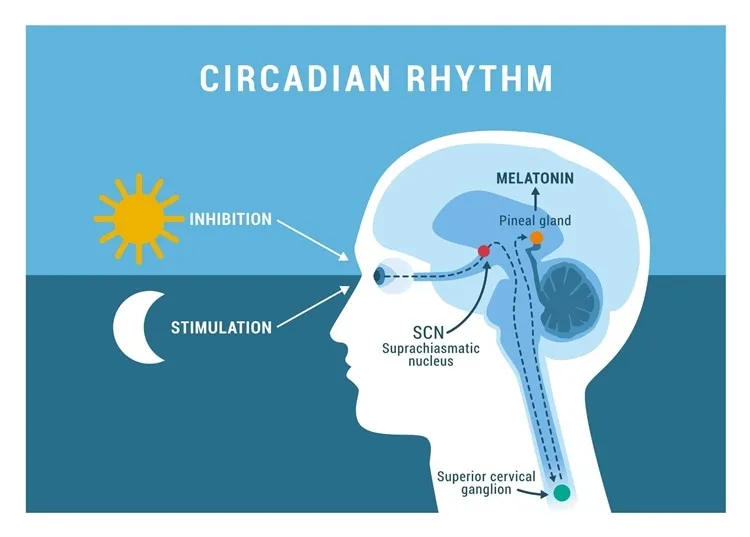Table of Contents
I. Introduction
In the hectic rhythm of contemporary life, sleep typically takes a second place, yet its influence on weight
Management and fat burning are more crucial than people may assume. While many of us
attention to nutrition and exercise While attempting to manage our weight, sleep is typically forgotten.
Yet, it is during sleep that our bodies conduct crucial metabolic activities that can considerably
impact our capacity to keep or lose weight. Understanding the profound relationship
between sleep and weight control is not simply beneficial—it’s vital for anybody looking
to living a better lifestyle.
As we begin to investigate this delicate relationship, we’ll find out how the various phases of sleep
contribute to hormonal balance, metabolism, and overall energy control. From influencing
the hormones that govern hunger to influence how well our systems digest nutrition,
Sleep has a vital function in creating our physical wellbeing. Moreover, the interruption of
Sleep patterns from contemporary lifestyles or sleep problems can have far-reaching consequences for
our weight and general well-being.
By looking further into the science of sleep and its relation to weight control,
This post seeks to give a complete overview that empowers readers with the
knowledge to make educated judgments regarding their sleep patterns. On this basis, we will
examine practical ways for boosting sleep quality and comprehend the function of sleep in
metabolic and hormonal balance, and acknowledge the vital relevance of managing sleep.
disorders. All of these components together illustrate that excellent sleep isn’t simply a luxury—it’s a
important component of a healthy, balanced existence.
II. Understanding the Basics of Sleep
A. What is sleep?
Sleep is a complicated biological process that rejuvenates our body and mind, which is needed for
preserving total health. It is not only a moment of relaxation but a dynamic action during which
Important processes in brain growth, emotional management, and physical wellness occur.
Throughout the night, several areas of your brain arrange the cycle of sleep stages that
repair and replenish the body, making it vital for cognitive function, emotional management, and
physiological balance.
B. phases of sleep

Each night, we cycle through numerous phases of sleep, each serving a specific function in our health.
These phases are separated into non-rapid eye movement (NREM) sleep and rapid eye movement.
(REM) sleep. The NREM stage can be further broken down into three phases:
• Stage 1: This is the lightest stage of sleep, generally characterized by the sense of
dropping that jolts you awake. It’s a quick, transitory moment that lasts only a few minutes.
allowing the body to slow down.
• Stage 2: During this stage, your body begins to prepare for deep sleep. Heart rate and
breathing regulates, body temperature decreases, and brain waves settle down with
periodic bursts of fast waves called sleep spindles.
• Stage 3: Known as deep sleep or slow-wave sleep, this period is critical for physical
recuperation, immunological function improvement, and growth hormone release. It is the most
restorative stage of sleep, lowering sleep drive, and preparing the body to enter REM.
sleep.
REM sleep follows the NREM stages and is when most dreaming happens. Your brain is engaged,
The eyes dart back and forth under the lids, but the body remains relatively calm. REM sleep is
crucial for processing emotions and memories and for mental rehabilitation.
C. How Much Sleep Do We Need?
While sleep demands might vary by age and lifestyle, doctors typically prescribe between 7 and 9
hours for adults. This recommended sleep time supports several biological systems, including those
implicated in metabolism and weight control. Children and teens demand more sleep.
frequently between 9 and 11 hours, due to their maturing bodies and brains. Sleep requirements also differ.
during the lifespan, impacted by exercise levels, health issues, and hereditary variables.
Understanding the pattern of sleep and appreciating its importance can benefit individuals.
prioritize sleep and notice indicators of sleep deficiency or problems. A well-regulated sleep
cycle not only improves physical and mental health but also plays a crucial role in emotional
well-being and lifespan. By aligning our lifestyle to allow good sleep patterns, we
can substantially boost our quality of life and general health.
III. The Science of Sleep and Metabolism
A. How Sleep Affects Hormones

Sleep substantially alters hormonal balances that govern hunger and metabolism. Two
Key hormones altered by sleep are ghrelin and leptin. Ghrelin, frequently dubbed the ‘hunger
hormone,’ is generated in the stomach and stimulates the brain to enhance hunger. Conversely,
Leptin, generated by fat cells, provides signals of satiety, informing your brain that you are full. When sleep is disturbed, ghrelin levels increase, and leptin levels fall, which might lead to increased
hunger and appetite, making weight control more tough.
B. Sleep and Caloric Regulation
A good night’s sleep helps manage the calories we ingest and spend. During sleep, the
body’s energy expenditure is reduced; however, this is a key moment for the body to balance energy.
resources. Proper sleep maintains a healthy metabolism, enabling the body to properly digest.
carbs and fats. When sleep is inadequate, the body’s capacity to metabolize glucose is
compromised, resulting in greater blood sugar levels and increased insulin resistance, which can
encourage fat accumulation.
C. The Role of Sleep in Fat Storage
Lack of sleep can contribute to increased fat accumulation by changing how our body processes and stores carbohydrates. This shift in metabolism happens owing to alterations in insulin action. Insulin
regulates blood sugar levels by promoting the absorption of glucose into cells. Insufficient sleep can
contribute to increased insulin levels and impaired insulin sensitivity, encouraging fat formation.
notably in visceral fat reserves, the sort of fat that surrounds essential organs and presents health
risks.
IV. Sleep Deprivation and Weight Gain
A. Studies Linking Sleep Loss to Obesity
Numerous studies have revealed a clear association between sleep deprivation and an
higher risk of obesity. Adults who habitually sleep fewer than six hours every night are at a
greater risk for developing metabolic disorders, including increased waist circumference and
increased levels of fasting glucose, lipids, and blood pressure. For instance, large-scale
Epidemiology research has shown that those who reported sleeping fewer than six hours per
night had a considerably increased probability of becoming overweight or obese compared to those
They slept seven to nine hours.
B. Mechanisms Behind Weight Gain
When deprived of sleep, the body undergoes many physiological changes that might lead to
weight increase. Firstly, as already noted, hormonal abnormalities increase appetite and
appetite. Secondly, sleep loss can lead to increased weariness, limiting physical activity.
levels, and so lowering the quantity of calories expended during the day. Moreover, the
Lack of sleep has been related to worse decision-making and impulse control, specifically
concerns eating choices, prompting consumers to select higher-calorie, sugary, and fatty meals.
as rapid energy sources.
C. Real-life Examples of Sleep and Weight Gain
Consider the situation of persons who work night shifts and the influence on their weight over
time. Shift workers typically encounter a disturbance in their circadian cycles, leading to erratic
sleep habits that might decrease metabolism. Studies have revealed that those working nights
Shifts tend to have greater incidences of obesity and metabolic illnesses. These laborers often
suffer “social jetlag,” when their biological clock is out of sync with their social clock,leading to misalignment that impacts eating patterns and exercise routines, consequently boosting
weight gain concerns.
These sections highlight the crucial role that sleep plays in regulating metabolic processes and
how disturbances in sleep habits can directly lead to weight gain and obesity.
Recognizing the significance of sleep is a critical step in maintaining a healthy weight and overall
excellent health.
V. Strategies for Improving Sleep for Better Weight Management
A. Creating an Ideal Sleep Environment

Creating a soothing and pleasant sleep environment is a key step in increasing
sleep quality. This entails improving different areas of your bedroom to boost
undisturbed sleep. Ensure your bedroom is cold, quiet, and dark. Consider utilizing a blackout
curtains, eye masks, and white noise devices to block out light and sound. The mattress and
Pillows should provide enough support and comfort adapted to your sleeping posture.
B. Sleep Hygiene Practices
Good sleep hygiene entails having a consistent sleep pattern and avoiding stimulants.
before bedtime. This involves going to bed and getting up at the same time every day, even on
weekends, which helps to maintain your body’s natural clock. Avoid coffee and nicotine.
near bedtime, as they might impair sleep. Limit exposure to displays from gadgets such as
cellphones and laptops before bed, since the blue light emitted might interfere with the
synthesis of the sleep-inducing hormone melatonin.
C. Role of Diet and Exercise

Balancing nutrition and regular physical activity can considerably enhance sleep quality, and hence
assist with weight management. Avoid heavy or substantial meals within a couple of hours of bedtime.
Try to incorporate items in your diet that encourage sleep, such as those high in tryptophan,
magnesium, and calcium. Exercise frequently, but avoid strenuous exercise close to bedtime since it
can boost alertness. Activities like yoga or mild stretching in the evening can help increase
better sleep.
VI. Innovative Sleep Technologies and Tools
A. Sleep Tracking Devices

Modern technology offers different instruments, such as wearable sleep monitors, that assist in monitoring and evaluate sleep habits. Devices such as Fitbit, Apple Watch, and others give detailed
insights into sleep duration, quality, and phases. They measure motion, heart rate, and
respiratory patterns to identify when you are in light, deep, or REM sleep. This data can be invaluable for finding trends or interruptions in sleep that you would not otherwise notice.
enabling targeted improvements.
B. Apps for Sleep Improvement

Several smartphone applications are meant to promote sleep through meditation, relaxing
strategies, and sleep monitoring. Apps like Calm and Headspace provide guided meditations.
and bedtime tales to help people relax before bed. Sleep Cycle employs sound analysis to monitor
your sleep stages and wake you up gently during your lightest sleep period, making mornings
less startling. These applications can play a crucial role in building good sleep practices and
boosting overall sleep quality.
These techniques and tools not only assist in improved sleep hygiene and surroundings but also
equip individuals with data and tools to take responsibility for their sleep health.
Implementing these can lead to increased sleep quality, which is necessary for successful weight loss.
management and general well-being.
VII. Addressing Common Sleep Disorders
A. Identifying Common Sleep Disorders
Common sleep problems such as insomnia, sleep apnea, restless legs syndrome (RLS), and
Narcolepsy may dramatically disturb typical sleep habits and consequently affect weight.
Insomnia entails trouble falling or staying asleep, whereas sleep apnea is defined by
breathing disruptions during sleep. Restless legs syndrome creates painful feelings.
in the legs with an uncontrollable want to move them, and narcolepsy entails excessive,
uncontrolled daytime sleepiness.
B. Treatment and Management
Effective treatment of sleep disturbances frequently needs a mix of medical intervention and
lifestyle adjustments:
• Insomnia: Behavioral adjustments, such as enhancing sleep hygiene, are frequently first-line
treatments. Cognitive Behavioral Therapy for Insomnia (CBT-I) can also be extremely
effective.
• Sleep Apnea: Continuous Positive Airway Pressure (CPAP) Equipment and Lifestyle
Modifications such as weight reduction and avoiding alcohol before bedtime are typical.
treatments.
• Restless Legs Syndrome: Lifestyle modifications and drugs can help control
symptoms.
• Narcolepsy: Scheduled naps and some drugs can help manage the symptoms.
It is vital for people who feel they could have a sleep issue to get professional
medical guidance for proper diagnosis and treatment.*
VIII. Case Studies and Success Stories
A. Personal Stories
Many individuals have altered their health by emphasizing sleep and altering their
lifestyle. For example, a middle-aged lady suffering from weight gain and sleeplessness began taking
a CPAP machine to treat her untreated sleep apnea. As her sleep improved, so did her
energy levels, allowing her to engage in regular physical exercise and adopt healthier eating habits.
choices. Over six months, not only did her sleep quality improve drastically, but she also dropped
a substantial quantity of weight.
B. Lessons Learned
These success stories offer practical insights and encouragement for others suffering with similar
issues. They highlight the enormous influence that prioritizing sleep may have on weight.
management and overall health. Key teachings include:
• The necessity of detecting and treating sleep problems to enhance sleep quality.
• The successful integration of lifestyle modifications, such as food and exercise, to increase the
benefits of improved sleep.
• The benefits of consistency and tenacity in creating excellent sleep habits and how this
can lead to sustained health advantages.
These sections underscore the significance of recognizing and managing sleep problems.
just to improve sleep itself but also to boost life quality and health outcomes, including
weight control. The personal tales give practical illustrations of how actual people
have benefited from making sleep a priority, bringing readers relevant and inspirational success.
stories.
IX. Conclusion
Understanding the vital function of sleep in weight control and fat burning can empower
us to make educated choices regarding our sleep patterns. As we’ve studied throughout this post,
Sleep influences our metabolic processes, hormone levels, and general energy balance, which in
impact our weight and health. Investing in excellent sleep is equivalent to investing in a healthy,
more robust life. It’s vital not only for individuals wanting to manage their weight but also for
everyone looking for good health.
By applying the measures recommended, such as enhancing your sleep environment,
By sticking to excellent sleep hygiene and employing new sleep technology, you may substantially
increase your sleep quality. Remember, the path to greater sleep and health is a progressive
procedure that takes consistency and devotion. Begin by analyzing your existing sleep patterns.
Then examine which areas require improvement. Small, gradual adjustments can lead to dramatic
health advantages over time.
Frequently Asked Questions (FAQ)
1. How precisely does sleep affect my metabolism?
Sleep influences metabolism largely. by its influence on hormones that control appetite and energy expenditure. Insufficient sleep can lead to hormonal abnormalities that increase appetite and reduce
metabolic rate, thereby influencing how your body processes and stores nutrients.
2. Can improved sleep quality help me lose weight?
Yes, enhancing sleep quality can assist in controlling appetite and increasing metabolic functioning, helping in weight reduction and
improved weight management. Consistent, restorative sleep helps maintain hormonal balance.
enhances insulin sensitivity and can boost the efficiency of diet and exercise.
routines.
3. What are some typical sleep problems that impact weight?
Common sleep Diseases that might affect weight include insomnia, sleep apnea, and restless legs.
syndrome. These diseases disturb sleep quality and duration, which can lead to
increased stress hormone levels, greater hunger, and lower enthusiasm for physical
activity.
4. Are there certain meals that might help promote sleep?
Foods rich in tryptophan, Magnesium and melatonin can encourage better sleep. Examples include turkey, which includes tryptophan; almonds, which are strong in magnesium; and cherries, which
naturally contain melatonin. Incorporating these items into your diet may help enhance
sleep quality.
5. How do sleep monitors operate, and are they effective?
Sleep trackers monitor motions and physiological markers during sleep to measure sleep quality and duration. They employ sensors to monitor movements and heart rate, predicting sleep phases from these
data. While not medically exact, sleep monitors can give important information about your
sleep patterns, enabling you to make intelligent modifications.
6. What should I do if I suspect I have a sleep disorder?
If you believe you have slept condition, it’s crucial to visit with a healthcare expert who can diagnose and
propose suitable therapy. They may advise a sleep study to correctly
evaluate the issue and offer alternative treatment options customized to your requirements.
By answering these prevalent queries, we seek to better clarify the link between
sleep and weight control, urging everyone to treat their sleep seriously as a
vital basis for complete health.

